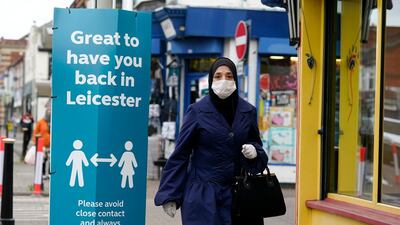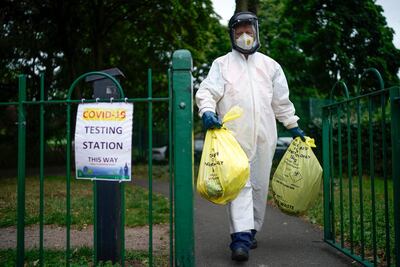The British government has placed a single city on lockdown for the first time.
All schools and non-essential shops in Leicester, in central England, must close and the government has urged people to stay at home after a localised coronavirus outbreak.
Health Secretary Matt Hancock said nationwide moves to ease a three-month lockdown would no longer apply in Leicester because of its high rate of Covid-19.
"We must control this virus. We must keep people safe," Mr Hancock told the British Parliament.
The lockdown order also recommends against all but essential travel to Leicester.
The city accounted for "10 per cent of all positive cases in the country over the past week", Mr Hancock said.
"We recommend to people in Leicester, stay at home as much as you can and we recommend against all but essential travel to, from and within," he told the House of Commons on Monday evening.
The seven-day infection rate in Leicester was 135 cases for every 100,000 people, three times higher than in the city with the next highest rate, Mr Hancock said.
When asked by fellow Conservative MP Nus Ghani why children in Leicester seemed to be more susceptible to the virus, Mr Hancock said the disease has a "very, very low risk to any individual child".
The government, Mr Hancock said, was looking into the possibility that young people had been spreading the disease among themselves.
Surrounding areas in the county of Leicestershire were included in the lockdown measures.
Leicester has a population of about 333,000 who, census data shows, are 50.6 per cent white and 37.1 per cent Asian, among other ethnicities.
The owner of Ye Olde Sweet Shop in Leicester city centre told Britain's Press Association news agency that further restrictions would affect him "financially very, very badly".
"The impact of coronavirus hit us on March 23," Rakesh Parmar told the BBC.
"We closed for 10 weeks and then opened again on June 15. It's been one long slog.
Pubs and restaurants in the city, which were due to reopen on Saturday for the first time since March, will now stay shut.
The UK is gradually easing its national lockdown, with non-essential shops open and further relaxation of rules due on July 4.
At 43,575, Britain's coronavirus death toll is Europe's highest.
The national lockdown was imposed on March 23, but has been gradually loosened over May and June.
Prime Minister Boris Johnson had announced that the authorities would seek to control the virus through local measures, in what he described as a "Whac-a-Mole" strategy.
Mr Johnson is looking to move past criticism of his government's handling of the pandemic with a plan to repair the economic damage and reshape the country.
"We cannot continue simply to be prisoners of the crisis," Mr Johnson said on Tuesday as he unveiled a £5 billion (Dh22.6bn) stimulus package.
"We must work fast because we've already seen the vertiginous drop in GDP and we know that people are worried now about their jobs and their businesses."
His message was delivered at a college in the central English town of Dudley only 50 miles from Leicester.
Nevertheless with an exhortation to "build, build, build", Mr Johnson announced plans to speed up government infrastructure spending and cut through the red tape around planning to make property development easier.
"We will build the hospitals, build the schools, the colleges. But we will also build back greener and build a more beautiful Britain," he said.
Promising not to cut spending he compared his plan to former US president Franklin D Roosevelt's 1930s "New Deal" programme, which included job-creating public works projects to help the United States recover from the Great Depression.
"It sounds like a prodigious amount of government intervention, sounds like a new deal … If that is so, then that is how it's meant to sound," Mr Johnson said.
_______________











